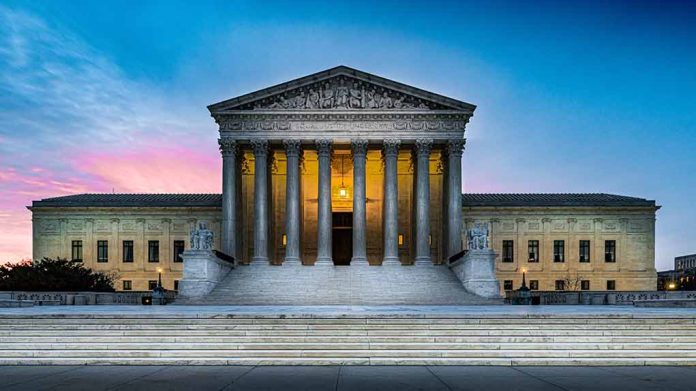
Federal employees serving in military reserves are now legally entitled to full salary compensation during military leave, following a landmark Supreme Court ruling that could potentially cost the government billions in back pay.
Key Takeaways
- The Supreme Court ruled federal employees are entitled to differential pay when serving on active duty in military reserves during a national emergency
- Federal civilian employees no longer need to prove a direct connection between their service and a specific emergency to receive differential pay
- The Feliciano v. Department of Transportation case overturned previous interpretations, strengthening veterans’ rights
- Affected current and former federal employees may be entitled to significant back pay claims
- Government agencies now face administrative challenges adapting payroll systems to comply with the ruling
Supreme Court Reinforces Military Reservists’ Pay Rights
In a decisive victory for veterans’ rights, the Supreme Court has ruled that federal employees who serve as military reservists during national emergencies are entitled to receive their full civilian salaries. The April ruling specifically addressed the differential pay statute passed in 2008, which was designed to ensure federal employees don’t lose income when called to serve their country. The Court’s interpretation significantly broadens eligibility criteria, allowing more reservists to qualify for this important financial protection during their military service.
The Court specifically determined that federal employees are “entitled to differential pay if the reservist’s service temporally coincides with a declared national emergency without any showing that the service bears a substantive connection to a particular emergency,” according to the Supreme Court ruling in Feliciano v. Department of Transportation.
A recent Supreme Court ruling could lead to numerous pay claims for federal employees also serving as military reservists. https://t.co/NZNb34qgN1
— NEWSMAX (@NEWSMAX) June 18, 2025
Expanded Eligibility and Retroactive Claims
The ruling effectively vacated the Federal Circuit’s previous interpretation in Nordby’s case, remanding it for reconsideration under the new standard. This has profound implications for thousands of reservists who previously had their claims for differential pay denied. Under the clarified interpretation, reserve military personnel called to active duty for a “contingency operation” are entitled to 22 days of compensated leave per year from their federal civilian employer. This represents a significant expansion of benefits that rightfully recognizes the sacrifices made by our military service members.
The Court determined that service “during a national emergency” qualifies federal employees for these differential pay benefits without requiring them to prove their service was directly connected to specific emergency operations, according to the Federal Circuit and United States Supreme Court.
Additionally, the ruling builds upon previous legal precedents that have steadily strengthened veterans’ rights in the federal workplace. The O’Farrell v. Department of Defense case established a broader interpretation of what constitutes support for contingency operations, thereby expanding eligibility for additional paid military leave. Similarly, the Butterbaugh v. Department of Justice case required agencies to compensate employees for improperly charged military leave that occurred prior to December 2000, creating another pathway for rightful compensation of service members.
Financial and Administrative Impact on Federal Agencies
The financial implications of this ruling are substantial for federal agencies, which now face the prospect of processing potentially thousands of claims for back pay. Current federal employees who successfully file claims with the Merit Systems Protection Board (MSPB) can receive restored annual leave, while retired or separated employees may be entitled to lump-sum payments. This creates significant budgetary pressures at a time when government spending is already under intense scrutiny from taxpayers frustrated with wasteful expenditures.
Government agencies are now scrambling to update their payroll systems and policies to comply with the Court’s interpretation. The administrative burden of processing retroactive claims, some dating back many years, presents logistical challenges that will require significant resources to address properly. Despite these challenges, the ruling represents a necessary correction that ensures our military reservists receive the financial support they have earned through their dual service to our nation as both civilian federal employees and military personnel.
Legal Assistance for Affected Reservists
Several law firms specializing in federal employment law have begun offering assistance to reservists who may be entitled to compensation under this ruling. Terrell Marshall Law Group and Tully Rinckey PLLC are among those providing free consultations to federal employees who served in the reserves but did not receive differential pay. These firms are handling claims on a contingency basis, meaning affected reservists can pursue their rightful compensation without upfront legal fees, removing a significant barrier to justice for many service members.
For federal employees who believe they may qualify for compensation under this ruling, the time to act is now. Claims must be filed with the MSPB, and the process requires specific documentation and legal arguments to be successful. President Trump has consistently supported our military personnel and veterans, and this ruling aligns with his administration’s commitment to ensuring fair treatment for those who serve our country. The Supreme Court’s decision represents a significant victory for military rights and properly recognizes the financial sacrifices made by those who serve in both civilian and military capacities.









